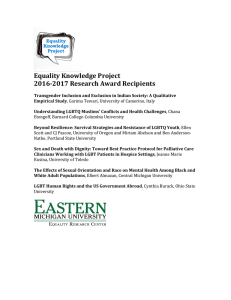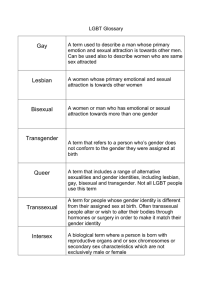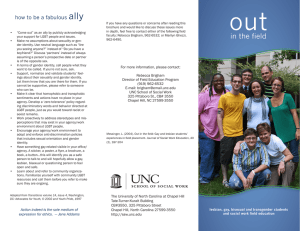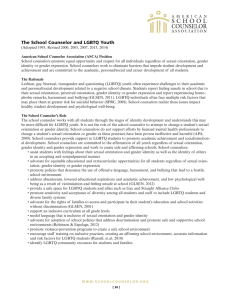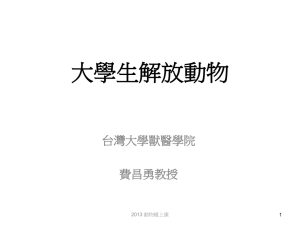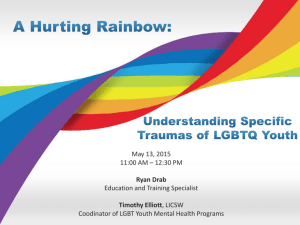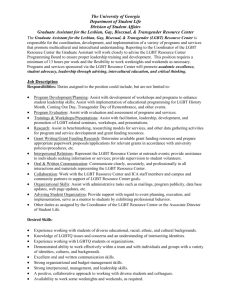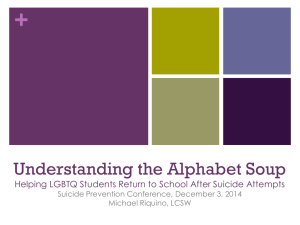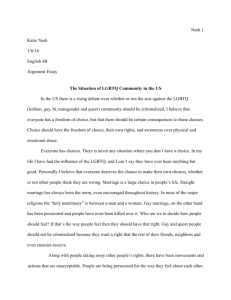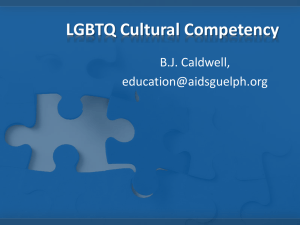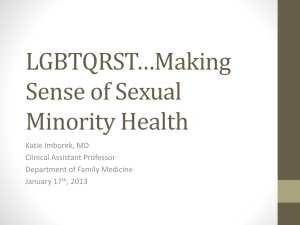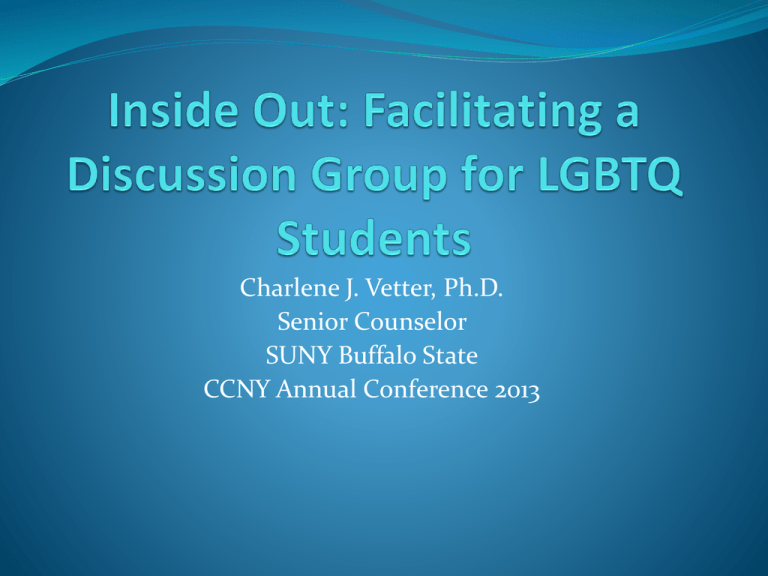
Charlene J. Vetter, Ph.D.
Senior Counselor
SUNY Buffalo State
CCNY Annual Conference 2013
Terminology/Basic Vocabulary
Sexual Orientation
emotional, romantic, sexual attraction to another person
Gender Identity
one’s personal sense of their gender
Transgender
umbrella term that includes transsexuals, cross-dressers, gender nonconforming
Transsexual
gender and sex do not line up-often (not always!) seek medical tx to bring
body/gender into alignment-avoid term unless an individual self-identifies
as transsexual
School Climate for LGBTQ Students
Research suggests educational outcomes are negatively
impacted by student perceptions/experiences
2010 Campus Pride State of Higher Education For
Lesbian, Gay, Bisexual & Transgender People
Rankin, Weber, Blumenfeld, Frazer
GLSEN National School Climate Survey (2011)
School Climate for LGBTQ Students
Campus Pride Survey (2010) 23% of GLBQ students
reported experiencing harassment compared to 12% of
heterosexual-identified students(n=5,149)
GLBQ students were 7x more likely to report that
harassment was based on sexual identity
Approximately 70% of transsexual students reported
experiencing harassment
School Climate for LGBTQ Students
GLSEN National School Climate Survey (2011)
82% of LGBT students were verbally harassed at
school because of their sexual orientation;64% were
harassed because of gender expression
The average GPA for LGBT students who experienced
frequent harassment was lower than LGBT students
experiencing less frequent harassment
The Story of Inside Out
Idea for group inspired by clients who expressed need to
connect with other LGBTQ students (e.g., questioning, out
to self but not others)
Campus pride alliance 2-3 large events per year-not a
facilitated discussion group
Inside Out was implemented to create a safe place for
students to discuss sexual orientation/gender identity
The main goal is to assist in identifying external/internal
roadblocks to self-discovery and open self-expression
The Story of Inside Out
Started in Spring 2009 semester
Weekly meetings
38 Students
Open group
Currently one facilitator (two in the past)
Important Considerations in Facilitating LGBTQ
Group
Examine personal beliefs/biases stereotypes PRIOR to
committing to be facilitator
Understand that negative messages about LGBTQ are
ubiquitous in our culture (family, media, religious
institutions) and these often become internalized
Heterosexism-the notion that being heterosexual is
expected/preferred (institutional/cultural)
Counselor Competencies
Association for Lesbian, Gay, Bisexual, Transgender Issues in
Counseling
“know that the normative developmental tasks of
LGBT adolescents frequently may be complicated or
compromised by identity confusion; anxiety and
depression; suicidal ideation and behavior; academic
failure; substance abuse; physical, sexual, and verbal
abuse; homelessness; prostitution; and STD/HIV
infection.”
Counselor Competencies
Association for Lesbian, Gay, Bisexual, Transgender Issues in
Counseling
“consider that, due to the coming out process, LGBT
individuals often may experience a lag between their
chronological ages and the developmental stages
delineated by current theories.”
“recognize that identity formation and stigma
management are ongoing developmental tasks that
span the lives of LGBT persons.”
Screening of Group Members
Students at any stage of coming out, questioning and
exploring their sexual orientation, and/or gender
identity.
Not appropriate for students who are seeking help to
change emerging identity
Not for straight allies
Typically referred to group by primary counselor
Themes that have Emerged….
How will others react if I discover that being LGBT is
part of my identity?
What will my life look like (The “American Dream”)
I know if I am ever to be in a same-sex relationship,
certain family members/friends would
disapprove/reject me
Themes that have emerged….
Is there a “right” way to be gay?
Students have described negative reactions if they
dress/act outside their chosen label (e.g, butch,
femme)
Students reported hearing negative
reactions/stereotypes related to bisexuality (e.g..
confused, can’t make up their minds, more likely to
cheat)
Themes that have emerged
Coming out as a lifelong process
Weigh the risks/benefits of disclosure with each new
person (“will I see the person again or not?”)
Different levels of “outness” between partners can be a
source of stress in the relationship
Tips for facilitating an LGBTQ Group
Marketing! Discussion group vs. therapy group…be
explicit about purpose/goals of group and that it is
NOT therapy
Facilitators are encouraged to be open about their own
sexual orientation/gender identity
If LGBTQ is not part of facilitator's identity, share
experiences that influenced becoming an ally
Tips for facilitating an LGBTQ Group
When discussing group rules at the outside emphasize
importance of respecting how group members choose to
describe/express themselves with regard to sexual
orientation or gender identity
All members must agree not to criticize or challenge any
label (e.g. bisexual) or the choice not to identity with a
given label
Basic understanding of terminology is important but
always ask what a given label means to the individual (don’t
assume that you know!)
Tips for facilitating an LGBTQ Group
If facilitator does not feel comfortable with their level
of knowledge/experience with any given topic, consult
a colleague or outside contact (e.g. community LGBT
center)
Examine/consider personal beliefs/biases/stereotypes
PRIOR to committing to facilitate
Semi-structured approach to group-allow group
members opportunity to set agenda/choose topics
Suggested Topics in Initial Phase
Where do negative messages/stereotypes come from?
What messages did students get during childhood/early
adolescence about LGBT?
What are the pros/cons of living/expressing openly vs.
staying closeted
What do you need to feel safe/comfortable working with a
professional (e.g., physician, counselor)
Kinsey’s research and scale-continuum of human sexuality
Challenges
Getting the word out/getting referrals
Open vs. closed group
Scheduling/Attendance-getting students to commit to
coming weekly
Confidentiality concerns-especially if group member is
simultaneously involved in campus pride alliance
Open to center clients vs. open to all students
Resources
Association for Lesbian, Gay, Bisexual, Transgender Issues in
Counseling-http://algbtic.org/resources/competencies
Campus Pride-www.campuspride.org
Gay, Lesbian & Straight Education Network-www.glsen.org
Human Rights Campaign-www.hrc.org
Stonewall Center University of Massachusetts-
http://www.umass.edu/stonewall/
National Center for Transgender Equality-http://transequality.org

